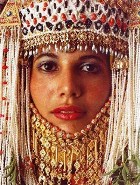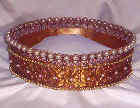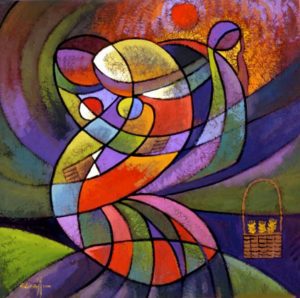Who was Naomi in the Bible story?
Naomi’s story has three parts:
- Three women in a foreign land, without money or protection. The situation seems hopeless. They have lost everything, and the oldest woman Naomi, mother-in-law to the other two, decides to return home to Judah. Book of Ruth 1:1-22.
- Looking for a husband. Naomi returns to Bethlehem
 with one of the young women, Ruth. They settle back into Naomi’s village community. Naomi notices that Boaz, a rich kinsman, is attracted to Ruth. Book of Ruth 2:1-23.
with one of the young women, Ruth. They settle back into Naomi’s village community. Naomi notices that Boaz, a rich kinsman, is attracted to Ruth. Book of Ruth 2:1-23. - Naomi sets things up. Boaz seems reluctant to act, so Naomi takes a hand in matters and instructs Ruth on how to catch her man. Ruth and Boaz marry, and Naomi has a grandson. Book of Ruth 3-4
Three destitute women
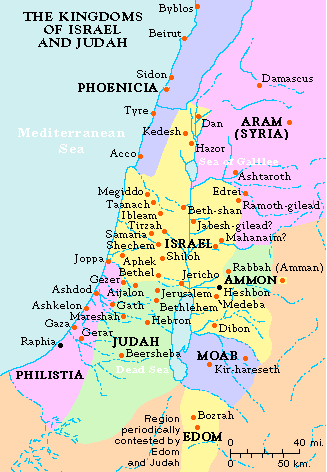
Map showing the location of Moab and Bethlehem – the journey taken by Naomi and Ruth
Naomi’s story had a bleak beginning.
- She was a foreigner in Moab, a country near to, but hostile to, her native country Judah.
- She had been a married woman with two grown sons – in other words comfortably off and secure, but she had lost everything.
- Her husband was dead and so were her two fine sons.
She seems to have inherited nothing, no land or goods, and her only option was to return to her native village, where she owned a little piece of land.
She told her two daughters-in-law, Orpah and Ruth, of her decision and prepared to bid them good-bye. They should, she said, go back to their mothers’ (curiously, not fathers’) homes.
Neither of them wanted to leave her, which says a lot about Naomi as a mother-in-law, but Naomi insisted, and one of them, Orpah, finally agreed to go home to her birth family.
The other young woman, however, was made of sterner stuff. She would not leave Naomi, and that was that.
The girl’s name was Ruth, and she clung to Naomi, literally clung to her, and refused to part.
The mother-in-law is the heroine!
This is significant. Naomi was a mother-in-law, usually the butt of cruel jokes, but in this story the mother-in-law inspired dogged loyalty.
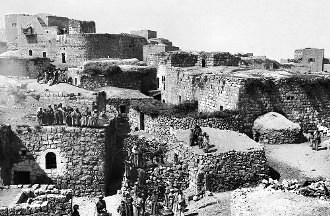
Bethlehem may have looked something like this Middle Eastern village
The two women, Naomi and Ruth, set off on an arduous journey. It was late summer, and the roads were not safe for two lone women. Eventually, however, they arrived in Naomi’s home town: Bethlehem.
The whole town seems to have turned out to see them, but their initial joy soon quietened. Naomi’s friends and family were aghast to see how much she has changed. The years were now etched into her face. ‘Can this be Naomi?‘ they asked.
Right back at you, says Naomi: ‘don’t call me Naomi (pleasant); call me Mara (bitter) instead. The years have been unkind to me. I’ve lost everything‘.
Well, not quite everything. She still has two assets:
- an agile brain, always worth having
- and lovely Ruth standing quietly beside her.
Looking for a husband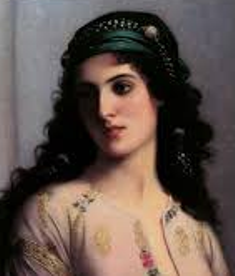
The thing that would solve Naomi’s problem was, of course, a rich husband for Ruth. Naomi immediately sets out to find one.
She does not have far to look. Elimelek, her dead husband, had a relative called Boaz who, though no longer young, was rich and kindly. Despite his undoubted suitability as a husband, he has never married. He is a long-standing bachelor, and none of the fond mothers with pretty daughters have been able to change his mind.
But he notices Ruth immediately (a good sign) when he sees her gathering surplus grain in one of his fields (there was an injunction in the Bible that the poor be allowed to gather suplus grain, and Boaz is obviously following this injunction – another good sign.)
He approaches Ruth and tells her to gather grain in his field and not to go anywhere else.
- He tells his workers not to pester her, and
- invites Ruth to help herself to water whenever she needs it – a small thing, but remember that all water had to be carried from a nearby stream, so Boaz was obviously favoring her.
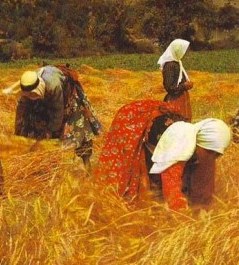
Women gathering in the harvest
Why are you being so kind? asks Ruth – though of course she has guessed. Because you are a woman of good repute, replies Boaz.
And who has given her this good repute? Naomi, who has been cleverly extolling Ruth’s virtues to all and sundry.
Ruth replies with a graceful speech; her behaviour is impeccable. Boaz later invites her to eat with him.
No doubt Boaz’s attentions to Ruth have been reported back to Naomi, not just by Ruth but by the village women, watching agog as the romance develops.
So far, so good. But Boaz is a confirmed bachelor, and Naomi realizes she must nudge him into some sort of definite commitment if she is to get him as a son-in-law.
Naomi sets things up
The harvest festival is about to be celebrated, and Naomi decides that the time for subtlety is past. She has, she tells Ruth, a definite goal: to find a home for Ruth where she will be well-provided for.
She gives Ruth some instructions:
- to wash and perfume herself, and dress in her best clothes
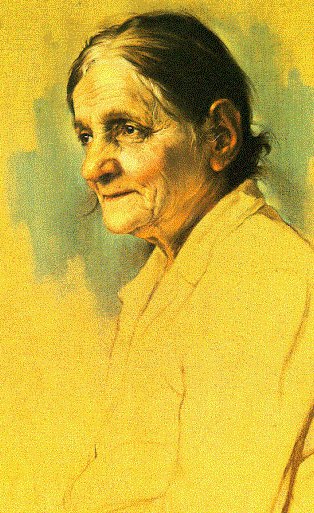
- to go to the threshing floor but stay discreetly hidden from Boaz
- to wait until, at the end of the evening, Boaz lies down to sleep, then
- to lie down beside him, uncover his feet and wait to see what happens.
It must be explained that in the Bible ‘feet’ was sometimes a euphemism for male genitals, and that there was a good deal of ribald joking at harvest festivals.
But Naomi was banking on her belief that Boaz would react honorably in this situation. As you will see, she was a good judge of character.
Naomi makes it happen
Ruth went to the threshing floor and did just as Naomi had told her, except that she took it a step further. She, not Boaz, proposed: ‘Spread the corner of your garment over me’ she said. At the time, ‘spreading one’s garment over someone’ meant marrying them.
Boaz reacted exactly as Naomi had hoped. He immediately offered marriage to Ruth, recognising that she had put herself in a compromising position and that the honorable thing was to offer marriage.
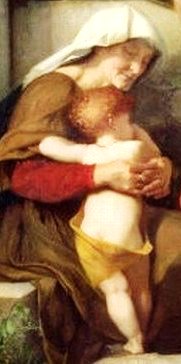
Naomi with her grandson Obed, detail from a painting by Levy
There were some minor details to be attended to. The following morning Boaz met with a council of elders and hammered out the details of a marriage agreement.
But Naomi knew that her plan had worked – and what is more, had worked magnificently. Both women could look forward to a comfortable, happy future. Both women would be well provided for.
And the story ended with the best news of all: Naomi, who had once asked to be called ‘bitter’, now held her little grandson, born to Ruth and Boaz, in her arms:
‘Then Naomi took the child in her arms and cared for him. The women living there said ‘Naomi has a son!’ And they named him Obed. He was the father of Jesse, the father of David…’
It is the Bible’s way of saying ‘and they lived happily ever after…’
What do the names mean?
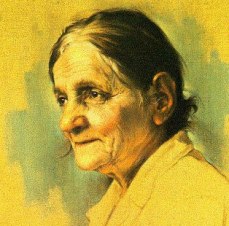 Naomi means ‘pleasant’, but the name she used later was Mara, meaning ‘bitter’.
Naomi means ‘pleasant’, but the name she used later was Mara, meaning ‘bitter’.
Ruth is a short version of ‘retut’, ‘lovely friend’.
Boaz means ‘powerful’ or ‘strong’.
Mahlon and Chilion, the sons of Naomi, mean ‘sickness’ and ‘used up’.
Orpah means ‘back of the neck’; she turned her back on Naomi.
Elimelech means ‘my God is king’.
Main themes of the story
- God’s unfolding plan. None of the later history of the Jewish people would have happened as it did, had Obed not been nudged into marriage by an elderly woman called Naomi.
- The importance of family. For all their faults, nothing can replace them. Stand by them, and expect them to do the same for you.
- Stay hopeful even when life seems to bring nothing but misforturne. Naomi was old, grief-stricken, poor and far from home, but she held on to her courage. Use the resources you’ve got.
Link to the Bible text for Naomi’s story
Paintings of Naomi
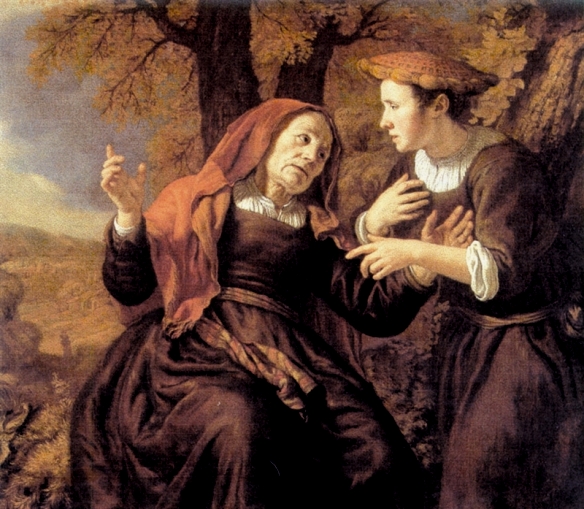
Naomi and Ruth, Jan Victors
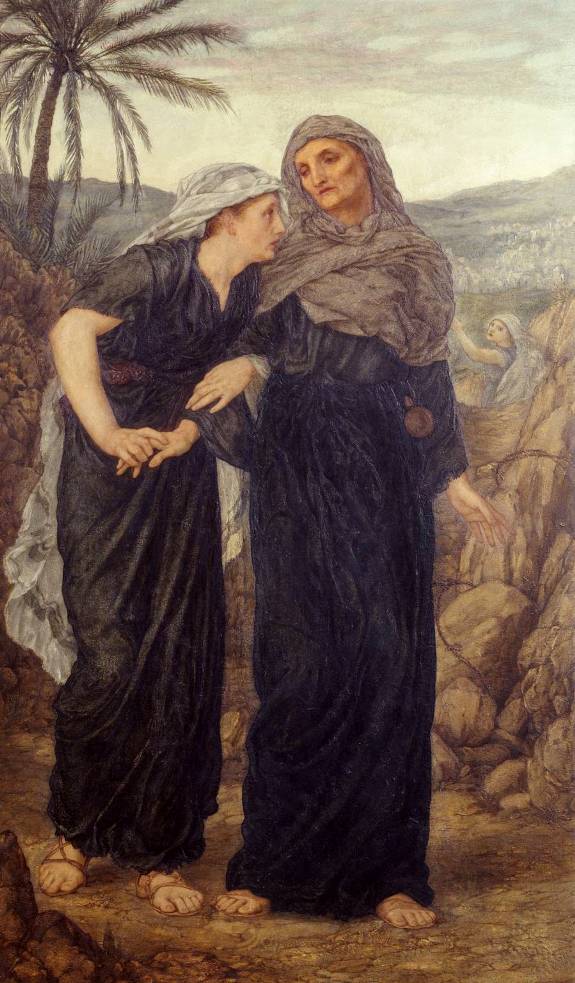
Naomi and Ruth, Thomas Matthews Rooke, 1876
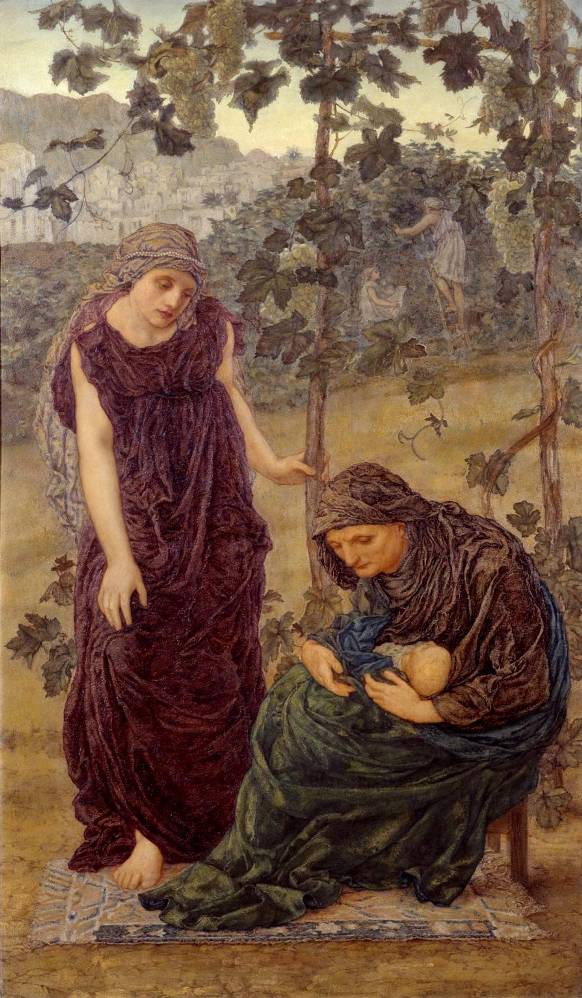
Naomi, Ruth and Obed, Thomas Matthews Rooke,1876
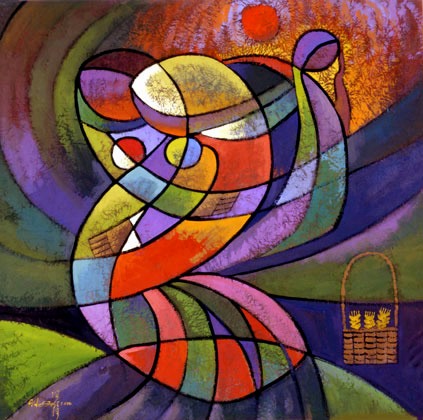
Naomi and Ruth, He Qi
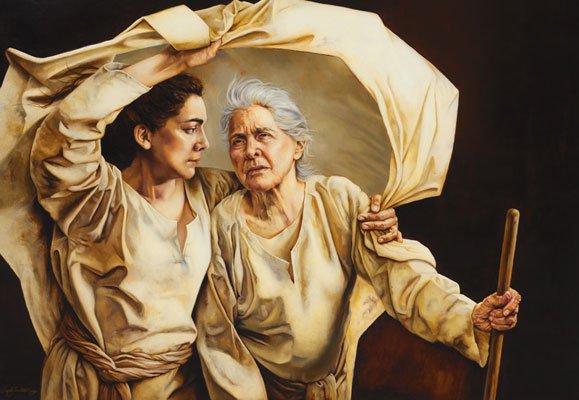
Ruth and Naomi, by Sandy Freckleton Gagon
Gagon says ‘My desire is to serve the Lord through my paintings’. Note the darkness behind the two women: this is their past. Note also the lines of sorrow etched on Naomi’s face, and the determination of Ruth to protect her.
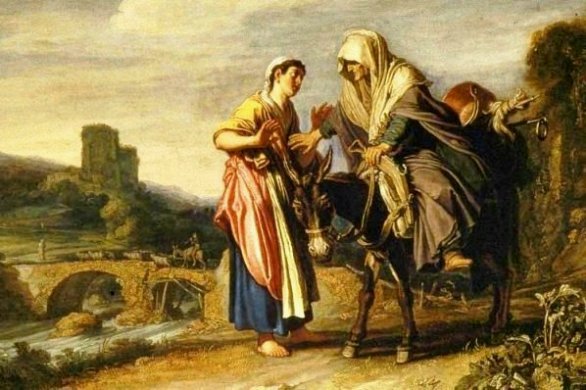 Naomi and Ruth, Pieter Lastman, 1624
Naomi and Ruth, Pieter Lastman, 1624
Most paintings of this scene focus on Ruth, but this shows Naomi as the active agent, pushing her daughter-in-law back towards her own people. Note the patient stance of the donkey loaded to the gills for a long journey.
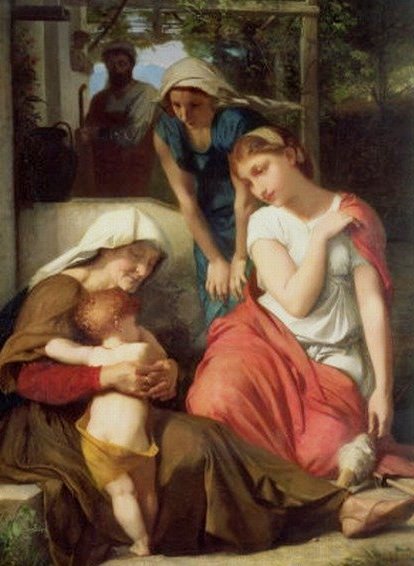
Naomi, Obed and Ruth, Emile Levy, 1859
An extraordinary image of the tender love between grandmother and grandson.
Boaz stands protectively in the background.
Read about
more fascinating women
of the Old and New Testaments
Search Box
![]()
Bible Study Resource for Women in the Bible: Naomi, Ruth and Boaz in Bethlehem
© Copyright 2006
Elizabeth Fletcher





